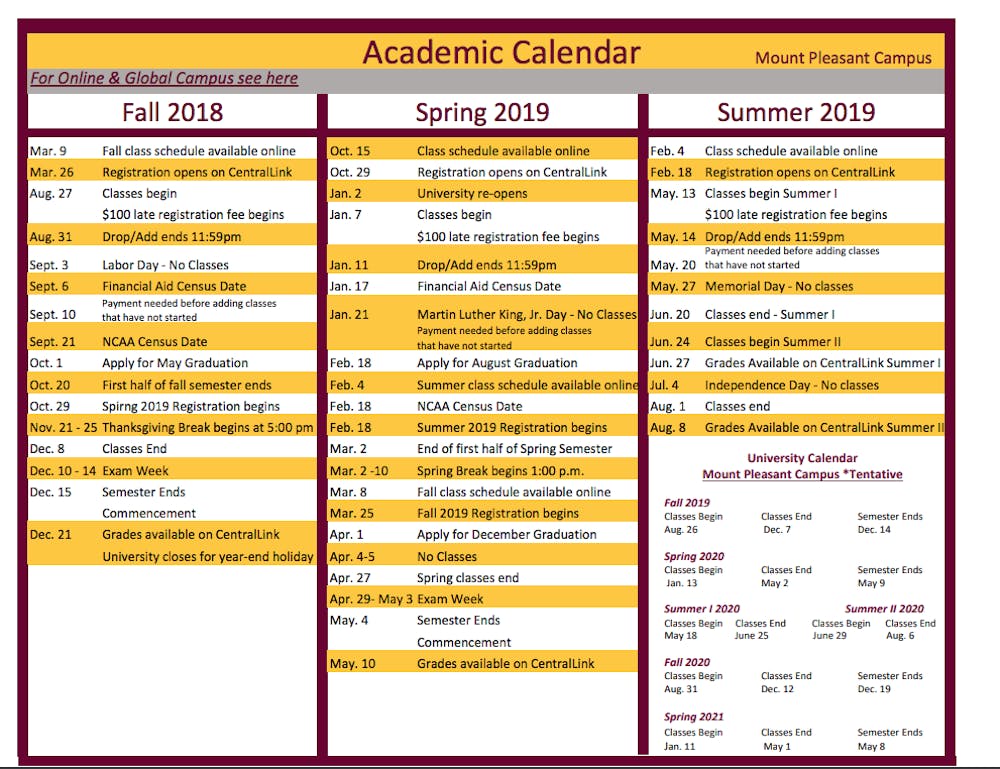CMU may have a fall break in the future
Currently, students get three days off in the fall, compared to eight in the spring.
Now that the semester is over, students get a few weeks to relax and spend time with family.
Thanksgiving provided a short break, but CMU has no scheduled fall break. Why is it that Central Michigan University students had to wait until week 13 of the 16-week semester for scheduled time off?
Student Government Association is looking to change this before the 2019-2020 academic year. SGA hopes to add a fall break in the middle of the semester right around mid-terms, so students can take a breath.
“I think it’s important for mental health reasons,” said SGA vice president Lyndi Rose, a Nashville junior. “We come back before Labor Day weekend and don’t have another break until Thanksgiving break. That’s a really long stretch for students to just keep going and going and going.”
SGA passed legislation for a three-day break in the fall semester on Nov. 19, and Academic Senate approved the legislation on Nov. 20.
The legislation will be brought to the university's calendar contract negotiation in the spring and summer. A break could be implemented during the 2020-2024 academic period.
The academic calendar year is negotiated between the faculty and administration. In the current academic calendar, students receive three days of break in the fall semester, compared with eight days in the spring semester.
Geography faculty member and president of the Faculty Association Union Anthony Feig was open to the idea of a fall break and believed other professors would be willing to consider it.
This year is a contract year for the calendar. However, Feig said the calendar can be opened up at any time to revisit concepts like fall break.
"The decision to have a fall break involves input from students, faculty and staff," said Ari Harris, assistant director of University Communications. "It is an ongoing discussion among several leaders on campus and will be a part of faculty negotiations next year."
Feig also said he does not believe a fall break would impact the structure of courses greatly. With plenty of notice, he said faculty would be able to reorganize his classes accordingly. Overall, Feig feels that a break would help students' moral and mental health, which in turn helps professors.
“At the end of October all the way through the end of the semester, things get really intense for people,” he said.
Rose said the number of students seeking help at CMU's Counseling Center peaks right around the time of mid-terms.
According to the American Psychological Association, counseling centers at universities have seen a 30 percent rise in the number of students seeking help, despite only a 5 percent rise in enrollment. The Anxiety and Depression Association of America states 85 percent of college students have felt overwhelmed at some point throughout the year.
These statistics indicate students tend to be very stressed out between all their classes and extracurriculars. They need a break, but often don’t feel they have the time to take one, especially in the midst of mid-terms.
Mattawan freshman Lily O'Connell said she has felt overwhelmed since mid-terms and that having a break would have given her some reprieve.
"I think it would have been helpful because it would kind of give us a break to kind of recuperate, get caught up on stuff, and just have a break in between midterms and the rest of the semester," said O'Connell.
Researchers have also found that suicide rates peak in the fall among adolescents and young adults.
Jordan Wolfe, a graduate student in counseling from Lansing, said as people head into the fall, the days are shorter and there is less sunlight, which can negatively impact a student’s mental health. A study in the Journal of Affective Disorders highlights that people tend to have more emotional distress when days are shorter and have less sunlight.
Wolfe said the change in season, in combination with the stress of school can leave students in a poor state of mind.
“I know that the fall semester is a big time of adjustment for a lot of students,” said Wolfe. “There’s a lot of factors at this time of year that can impact a students’ mental health, and it seems like having even a couple days set aside for students to kind of recuperate and prioritize self-care and sleep and study, I think, could be really beneficial.”
At Wolfe’s alma mater, University of Michigan, he had a fall break and found it relieving to take a few days to destress right after exams.
University of Michigan, Western Michigan University and Northern Michigan University are just a few schools in Michigan that offer a fall break. Even a rigorous ivy league school like Yale University offers a fall break to their students.
Hudson senior Kyle Tanner said that a two-day break right before or after mid-terms would be beneficial.
"I think it could be helpful for some students to have more time to maybe focus on themselves, because you're getting bombarded by school work right in the middle of the semester," said Tanner.





